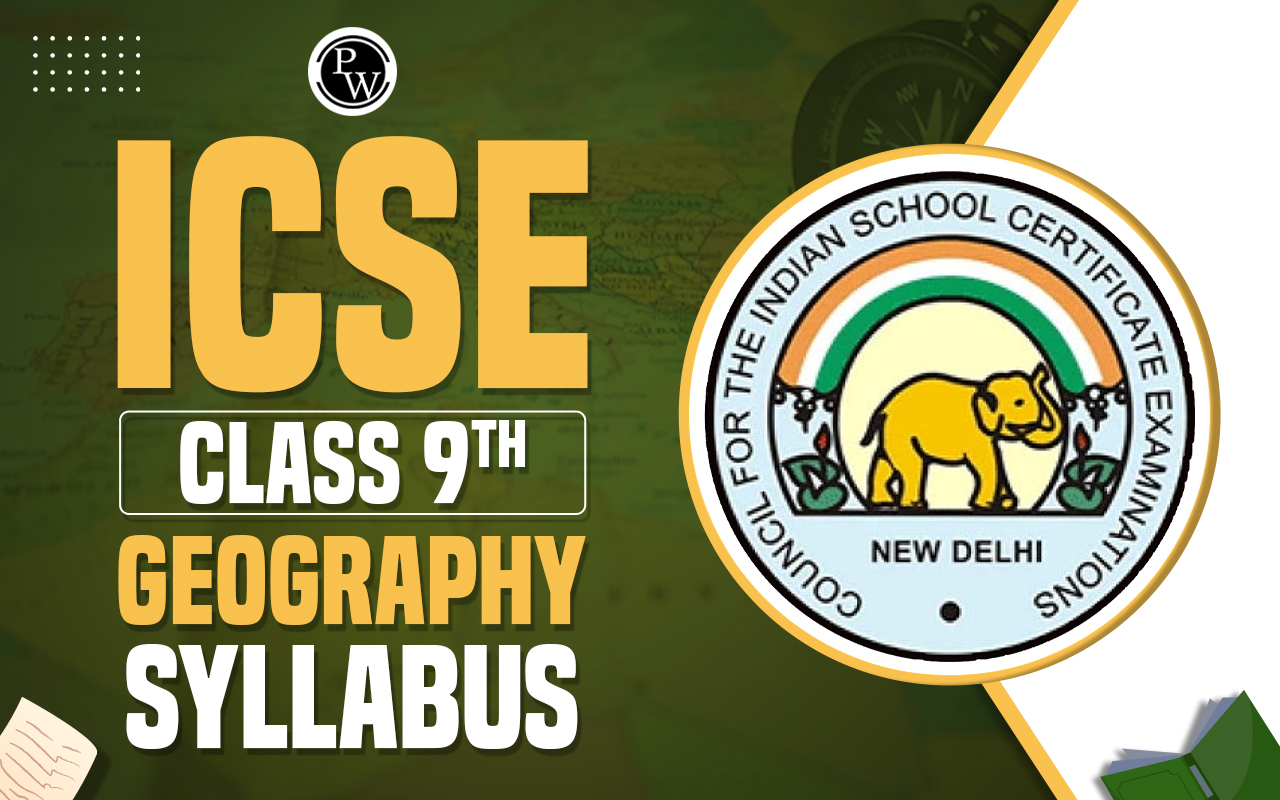

ICSE Class 9 Geography Syllabus 2025 has been officially released. Geography is a compulsory subject in Class 9 and helps students understand the physical and human features of the world around them. The syllabus includes key topics like the structure of the Earth, atmosphere, hydrosphere, pollution, natural regions of the world, and practical map work.
It also focuses on developing map skills and understanding real-world environmental issues. Internal assessments play an important role, with 20 marks divided equally between the teacher and an external examiner. Students are expected to complete practical tasks and a project to score well.
Overall, the syllabus is designed to build curiosity, practical knowledge, and a deep understanding of our planet.
ICSE Class 9 Geography Syllabus 2025 Overview
The ICSE Class 9 Geography syllabus for the academic year 2025 has been officially released by the CISCE. It outlines key topics, practical skills, and assessment patterns that students must focus on throughout the year.
ICSE Class 9 Geography Syllabus 2025 Chapter-Wise
ICSE Class 9 Geography Syllabus 2025 is divided into multiple chapters, each focusing on key geographical concepts and skills. Below is the chapter-wise list of topics students need to study during the academic year:
1. Our World:
Begin your journey by understanding Earth as a planet. Delve into the geographic grid, mastering the nuances of latitudes and longitudes. Unravel the mysteries of Earth's rotation and revolution, laying the foundation for understanding our place in the cosmos.- Geographic Grid :
- Introduction to longitudes and latitudes.
- Understanding latitude concepts, including main latitudes, parallels, and their applications.
- Exploring the Prime Meridian, Time (local, standard, zones), Greenwich Mean Time (GMT), International Date Line (IDL), and the concept of hemispheres.
- Locating positions via latitudes and longitudes.
- Understanding Great Circles and their applications.
- Revolution and Rotation :
- Earth's rotation: Direction, speed, effects (day-night cycle, sun's movement, Coriolis effect).
- Earth's revolution: Inclined axis effects, Equinoxes, Solstices.
2. Structure of the Earth:
Venture beneath the surface to explore Earth's intricate layers and captivating landforms. Navigate the rock cycle, distinguishing between igneous, sedimentary, and metamorphic rocks. Brace yourself for the dynamic forces of volcanoes, earthquakes, and the relentless processes of weathering and denudation.- Composition and Landforms :
- Earth's core, mantle, and crust.
- Exploring mountain ranges, plateaus, plains, their definitions, types, formations, and global & Indian examples.
- Rocks and Earth Processes :
- Differentiating minerals from rocks, types (igneous, sedimentary, metamorphic), characteristics, and formations.
- Overview of the rock cycle.
- Natural Phenomena :
- Introduction to volcanoes, types (active, dormant, extinct), and their effects.
- Understanding earthquakes: causes, measurements, effects, and global zones.
- Weathering processes: Physical, chemical, biological. Denudation processes and their impact.
3. Hydrosphere:
Dive into the realms of the hydrosphere, understanding its significance and complexities. Explore the rhythmic dance of tides and the influential currents like the Gulf Stream and KuroShio. Journey through oceanic patterns, uncovering the secrets of circulation and its profound impacts. The Hydrosphere- Hydrosphere : Defining the term.
- Ocean Dynamics :
- Tidal formations and patterns.
- Ocean currents: Patterns and significant currents like Gulf Stream, North Atlantic Drift, etc.
ICSE Class 9 Chemistry Syllabus
4. Atmosphere:
Elevate your understanding as you ascend into the atmosphere's embrace. Dissect its composition, structure, and the pivotal role of insolation. Grasp the mechanics of atmospheric pressure, winds, and the delicate balance of humidity, shaping our climatic experiences.- Atmosphere Layers : Troposphere, Stratosphere, Ionosphere, Exosphere; ozone layer and global warming effects.
- Insolation and Climate :
- Understanding insolation, terrestrial radiation, and their effects on temperature.
- Winds and Atmospheric Dynamics :
- Atmospheric pressure, major pressure belts, wind patterns, jet streams, and local winds.
- Humidity and Precipitation : Types, forms, and examples of rainfall.
5. Pollution:
Confront the pressing challenges of pollution, both ubiquitous and insidious. Identify its varied types, from air and water to soil, radiation, and noise. Trace the origins, understanding sources ranging from vehicular emissions to industrial effluents. Delve into its profound effects on our environment and health, and explore preventive measures to foster a sustainable future.- Pollution Types : Air, water (fresh and marine), soil, radiation, and noise.
- Sources & Impacts : Understanding sources and the environmental and health effects.
- Preventive Measures : Initiatives like carpooling, public transport promotion, energy conservation, organic farming, etc.
6. Natural Regions of the World:
Embark on a global odyssey, exploring diverse natural regions. Navigate through distinct locales, understanding their unique characteristics, climates, vegetation, and human adaptations, painting a vivid tapestry of Earth's geographical diversity.- Natural Regions : Exploring regions like tropical grasslands, deserts, monsoons, Mediterranean, taiga, tundra, and human adaptations.
7. Map Work:
Equip yourself with cartographic skills, mastering the art of map interpretation, analysis, and representation. Engage with maps, synthesizing knowledge, and translating theoretical understanding into visual insights.- Practical map-based tasks, including locating and naming major natural regions, oceans, seas, rivers, mountains, and plateaus globally.
ICSE Class 9 Geography Internal Assessment
For the ICSE Class 9 Geography Internal Assessment, students are required to maintain a comprehensive record file. Within this file, they must complete three exercises from a set list of options, each carrying a weightage of 10 marks. Here's a breakdown of the exercise options:- Map Utilization : Understanding the diverse uses of various map types.
- Directional Awareness : Illustratively explaining directions through diagrams.
- Scale Interpretation : Reading and comprehending scales, including statement of scale, graphic scale, and representative fraction method. Note: Drawing is not essential; a detailed explanation suffices.
- Town/Atlas Map Analysis : Scrutinizing a town guide map or atlas map to discern symbols, colours, directions, and distances.
- Contours Recognition : Drawing and recognizing diverse contour forms such as valleys, ridges, plateaus, and more.
- Sketch Mapping : Crafting a sketch map to systematize information about visits to notable locations like zoos or monuments.
ICSE Class 9 Geography Internal Assessment Practical and Project Assignments
Here's a refined list of suggested assignments for the ICSE Class 9 Geography Internal Assessment:- Weather Analysis : Document and decipher weather data from newspapers over a specified season.
- Modern Data Techniques : Harness contemporary tools like GPS, remote sensing, and satellite imagery to craft a presentation spotlighting pressing global issues such as resource utilization, development endeavors, and environmental calamities like earthquakes, floods, and cyclones.
- World Studies Exploration : Opt for a topic within World Studies, presenting insights via a PowerPoint or written format.
- Local Physical Features : Accumulate primary and secondary data, accompanied by photographs and sketches, showcasing physical attributes observed in local or visited terrains throughout the academic year.
- Environmental Challenges : Delve into global environmental dilemmas, communicating discoveries through diverse mediums like posters, essays, or multimedia presentations.
- Water Quality Assessment : Investigate and determine sources of water contamination in local aquatic bodies, evaluating water purity levels.
- Meteorological Instrumentation : Familiarize yourself with instruments like the mercury barometer, anemometer, and rain gauge, elucidating their functions and applications.
ICSE Class 9 Geography Syllabus 2025 PDF Download Link
ICSE Class 9 Geography Syllabus 2025 has been officially released by the Council for the Indian School Certificate Examinations (CISCE). Students can download the syllabus in PDF format using the direct link below. The PDF includes all the chapters, exam pattern, internal assessment details, and project guidelines. Downloading the syllabus makes it easier to plan your studies and keep track of what to cover during the academic year. It’s helpful to keep a saved or printed copy for regular reference.
ICSE Class 9 Geography Syllabus 2025
Study without using the internet
Preparation Tips for ICSE Class 9 Geography
-
Begin your preparation by reading the full syllabus. Know what each chapter covers and how it connects to real-world geography.
-
Practice map-based questions regularly. Learn to identify rivers, mountains, plateaus, oceans, and natural regions.
-
Refer to diagrams, satellite images, and charts to make learning more interactive and easier to retain.
-
Summarize each topic in simple points. Include definitions, key facts, and examples to help during revision.
-
Relate topics like pollution, natural disasters, and environmental issues to news and real-life scenarios.
-
Complete map skills and projects as per the guidelines. Choose interesting topics for the Geography project and ensure neat, well-researched work.
-
Allocate time each week for revision. Revisit difficult topics and practice sample papers to boost confidence.
ICSE Class 9 Geography Syllabus FAQs
Has the ICSE Class 9 Geography Syllabus 2025 been released?
What are the main topics covered in the ICSE Class 9 Geography syllabus?
How is the Geography exam for Class 9 structured?
How can students prepare effectively for Geography?












